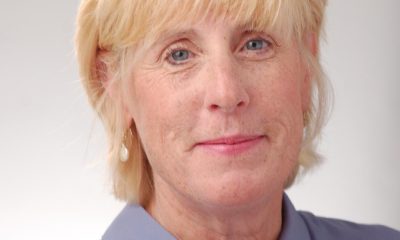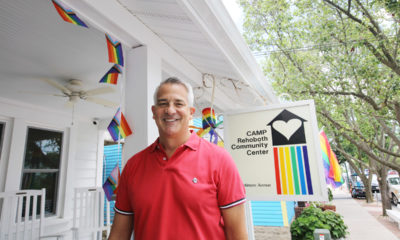National
Remembering the lives we lost in 2018
Tab Hunter, SpongeBob creator, AIDS activists and others


Actor and 1950s heartthrob Tab Hunter died earlier this year. (Photo courtesy the Film Collaborative)
Many acclaimed LGBTQ people died in 2018 from the worlds of entertainment, sports, advocacy, business and beyond. They include:
Victor Salisbury, a Realtor, banking analyst, gay rights supporter and D.C. area resident, died on Jan. 4 at 66.
Eddie Weingart, a D.C.-based massage therapist and anti-gun violence activist died at age 39 on Jan. 11. After the 2012 Newtown, Conn. mass shooting at Sandy Hook Elementary School, he helped to found the Project to End Gun Violence. In 2013, Weingart received the “Be the Change Award from the Washington Peace Center for his advocacy.
Dr. Mathilde Krim, a wealthy straight scientist and who was a pioneer in AIDS activism and research, died on Jan. 15 at age 91. She was the founding chairwoman of amfAR, the Foundation for AIDS Research. In 2000, she received the Presidential Medal of Freedom, the nation’s highest civilian honor.
Dennis Peron who led an effort to legalize marijuana for medical purposes in California died on Jan. 27 at age 71 in a San Francisco hospital.
Robert Pincus-Witten, a renowned art critic, died on Jan. 28 at 82 after a long illness.
John Mahoney, British-born actor, beloved for his portrayal of Martin Crane, the father on the hit TV sitcom “Frasier,” died on Feb. 3 at age 77. He was nominated twice for an Emmy for his role on “Frasier.”
Judy Blame, the fashion stylist, died at age 58 from cancer in London on Feb. 20. There was a retrospective of Blame’s work at the ICA in London in 2016.
David Ogden Stiers, who played Maj. Charles Emerson Winchester III in the renowned TV show “MASH,” died March 3 at age 75. At age 66, he came out as queer.
Barbara Wersba, an acclaimed lesbian author of books for young adults, died at age 85 on Feb. 18 in Englewood, N.J. She was among the first YA authors to write about same-sex relationships.
Hubert de Givenchy, the renowned French fashion designer who for decades dressed icons from Jacqueline Kennedy to Grace Kelley to Audrey Hepburn, died at age 91 on March 10.
Steve Elkins, founder and executive director of CAMP Rehoboth in Rehoboth Beach, Del., died at age 67 on March 15.
J.D. McClatchy, a Lambda Award-winning-poet, died at age 72 on April 10. He was the author of eight poetry collections and several opera librettos, including “Our Town” for Ned Rorem’s settings of Thornton Wilder’s drama.
Jean McFaddin, who planned Macy’s Thanksgiving Day parades, Santaland at Christmas, spring flower shows and July 4th fireworks in Manhattan for 24 years, died on April 18.
Richard Peck, a gay author of stories about rape, suicide and other difficult topics for young readers, died on May 27 at age 84.
LGBTQ rights activist Connie Kurtz died at age 81 at her home in West Palm Beach, Fla. Kurtz and her wife Ruth Berman were plaintiffs in a lawsuit over domestic partner benefits for New York City school employees.
On April 14, David Buckel, a prominent LGBTQ rights lawyer and environmental advocate, age 60, committed suicide by dousing himself with gas and setting himself on fire, in Brooklyn, N.Y. His death was a political act of self-immolation.
Robert M. Higdon, a friend of President Ronald Reagan and Nancy Reagan and fund-raising director for the Reagan Presidential Library, died at age 58 on June 19.
Dick Leitsch, a pioneering gay rights activist, died at age 83 on June 22 in Manhattan. In 1966, Leitsch led a protest when a bartender at Julius’ in the West Village in New York wouldn’t serve openly gay patrons.
Tab Hunter, a 1950s movie star, died on July 8 at age 86. He was closeted until he came out in his 2005 autobiography (written with Eddie Muller) “Tab Hunter Confidential.”
Tom Gallagher, the first Foreign Service officer to come out publicly as gay, died on July 8 at age 77. “I don’t want any of you… ever to take for granted what it took for people like Tom Gallagher to pave the way for all of you,” Hillary Clinton said in 2012 on the 20th anniversary of GLIFAA, a State Department LGBT employee organization.
Melanie Kaye/Kantrowitz, feminist, activist and author died at age 72 on July 10.
Gary Beach, an actor who won a Tony Award for his performance as director Roger De Bris in “The Producers,” died at age 70 on July 17.
Charles Hamlen, the founder of Classical Action: Performing Arts Against AIDS, died at age 75 on Aug. 1. He started the group, which later merged with Broadway Cares/Equity Fights AIDS, in 1993 five years after his partner died of AIDS in 1988.
John Glines, who won a Tony Award as a producer of “Torch Song Trilogy,” in 1983, died on Aug. 8 at age 84. At the Tonys, Glines thanked his lover Lawrence Lane. It’s believed to have been the first time anyone at the Tonys said they were thanking their gay lover, reported the New York Times.
Vivian Matalon, who won a Tony Award for directing “Mornings at Seven” in 1980, died at age 88 on Aug. 15.
Craig Zadan, who with his producing partner Neil Meron, won the Academy Award for best picture for Chicago in 2003, died on Aug. 21 at age 69. They produced “The Sound of Music” and other live musical revivals for NBC.
Rev. Robert Wood, the first American clergy to support marriage equality and to urge churches to welcome gay people died on Aug. 20 at age 95, the Blade reported.
Lindsay Kemp, a choreographer and teacher of David Bowie and Kate Bush, died at age 80 on Aug. 24. Kemp and Bowie were lovers for a time.
Crime writer Amanda Kyle Williams died at age 61 on Aug. 31. She is the author of the Keye Street series, whose titles include “The Stranger You Seek.”
Disability advocate and gay rights activist Janet Weinberg died on Sept. 1 at age 63. She was a leader at LGBTQ rights groups, including the Gay Men’s Health Crisis Center.
Jeanne Ashworth, who won a bronze medal in the 500-meter race at the 1960 Winter Olympics in Squaw Valley, Calif., died on Oct. 4 at age 80 at her home in Wilmington, N.Y. She was one of the first women to compete in speedskating in the Olympics.
Ruth Gates, an acclaimed coral-reef biologist and marine conservationist died at age 56 from brain cancer on Oct. 25. Gates advocated breeding a “super coral” to resist the impact of climate change.
Maria Irene Fornés, a playwright who won eight Obie awards, died at age 88 on Oct. 30. Acclaimed for her experimental theater work, she received an Obie for lifetime achievement in 1982. “She’s not spoken of as an important American playwright, and she should be,” playwright Tony Kushner told the New York Times.
Ray Hill, a former Baptist evangelist and ex-convict who became a Houston LGBT rights activist and helped to organize the first gay rights march on Washington died at age 78 on Nov. 24. In the 1980s, he helped to found Omega House for AIDS patients. Hill hosted a radio talk show for prisoners and their families.
Stephen Hillenburg, the creator of the cultural phenomenon “SpongeBob SquarePants” died at age 57 on Nov. 26. Hillenburg, who was straight, had amyotrophic lateral sclerosis. “SpongeBob,” the animated adventures of a yellow, pineapple-dwelling, sea creature, that airs on Nickelodeon, has a big queer following.

Advocacy groups are demanding the Trump-Vance administration not to deport two gay men to Iran.
MS Now on Jan. 23 reported the two men are among the 40 Iranian nationals who the White House plans to deport.
Iran is among the countries in which consensual same-sex sexual relations remain punishable by death.
The Washington Blade earlier this month reported LGBTQ Iranians have joined anti-government protests that broke out across the country on Dec. 28. Human rights groups say the Iranian government has killed thousands of people since the demonstrations began.
Rebekah Wolf of the American Immigration Council, which represents the two men, told MS Now her clients were scheduled to be on a deportation flight on Jan. 25. A Human Rights Campaign spokesperson on Tuesday told the Blade that one of the men “was able to obtain a temporary stay of removal from the” 10th U.S. Circuit Court of Appeals, and the other “is facing delayed deportation as the result of a measles outbreak at the facility where they’re being held.”
“My (organization, the American Immigration Council) represents those two gay men,” said American Immigration Council Senior Fellow Aaron Reichlin-Melnick in a Jan. 23 post on his Bluesky account. “They had been arrested on charges of sodomy by Iranian moral police, and fled the country seeking asylum. They face the death penalty if returned, yet the Trump (administration) denied their asylum claims in a kangaroo court process.”
“They are terrified,” added Reichlin-Melnick.
My org @immcouncil.org represents those two gay men. They had been arrested on charges of sodomy by Iranian moral police, and fled the country seeking asylum. They face the death penalty if returned, yet the Trump admin denied their asylum claims in a kangaroo court process.
They are terrified.
— Aaron Reichlin-Melnick (@reichlinmelnick.bsky.social) January 23, 2026 at 8:26 AM
Reichlin-Melnick in a second Bluesky post said “deporting people to Iran right now, as body bags line the street, is an immoral, inhumane, and unjust act.”
“That ICE is still considering carrying out the flight this weekend is a sign of an agency and an administration totally divorced from basic human rights,” he added.
Deporting people to Iran right now, as body bags line the street, is an immoral, inhumane, and unjust act. That ICE is still considering carrying out the flight this weekend is a sign of an agency and an administration totally divorced from basic human rights. www.ms.now/news/trump-d…
— Aaron Reichlin-Melnick (@reichlinmelnick.bsky.social) January 23, 2026 at 8:27 AM
HRC Vice President of Government Affairs David Stacy in a statement to the Blade noted Iran “is one of 12 nations that still execute queer people, and we continue to fear for their safety.” Stacy also referenced Renee Good, a 37-year-old lesbian woman who a U.S. Immigration and Customs Enforcement agent shot and killed in Minneapolis on Jan. 7, and Andry Hernández Romero, a gay Venezuelan asylum seeker who the Trump-Vance administration “forcibly disappeared” to El Salvador last year.
“This out-of-control administration continues to target immigrants and terrorize our communities,” said Stacy. “That same cruelty murdered Renee Nicole Good and imprisoned Andry Hernández Romero. We stand with the American Immigration Council and demand that these men receive the due process they deserve. Congress must refuse to fund this outrage and stand against the administration’s shameless dismissal of our constitutional rights.”
Federal Government
Top Democrats reintroduce bill to investigate discrimination against LGBTQ military members
Takano, Jacobs, and Blumenthal sponsored measure

Multiple high-ranking members of Congress reintroduced the Commission on Equity and Reconciliation in the Uniformed Services Act into the U.S. House of Representatives and the U.S. Senate, aiming to establish a commission to investigate discriminatory policies targeting LGBTQ military members.
Three leading Democratic members of Congress — U.S. Rep. Mark Takano (D-Calif.), who is the House Veterans’ Affairs Committee’s ranking member and chairs the Congressional Equality Caucus; U.S. Sen. Richard Blumenthal (D-Conn.), who is the Senate Veterans’ Affairs Committee’s ranking member; and U.S. Rep. Sara Jacobs (D-Calif.) — introduced the bill on Tuesday.
The bill, they say, would establish a commission to investigate the historic and ongoing impacts of discriminatory military policies on LGBTQ servicemembers and veterans.
This comes on the one-year anniversary of the Trump-Vance administration’s 2025 Executive Order 14183, titled “Prioritizing Military Excellence and Readiness,” which essentially banned transgender servicemembers from openly serving in the Armed Forces, leading to the forced separation of thousands of capable and dedicated servicemembers.
In a joint statement, Takano, Blumenthal, and Jacobs shared statistics on how many service members have had their ability to serve revoked due to their sexual orientation:
“Approximately 114,000 servicemembers were discharged on the basis of their sexual orientation between WWII and 2011, while an estimated 870,000 LGBTQ servicemembers have been impacted by hostility, harassment, assault, and law enforcement targeting due to the military policies in place,” the press release reads. “These separations are devastating and have long-reaching impacts. Veterans who were discharged on discriminatory grounds are unable to access their benefits, and under the Trump administration, LGBTQ+ veterans and servicemembers have been openly persecuted.”
The proposed commission is modeled after the Congressional commission that investigated and secured redress for Japanese Americans interned during World War II. Takano’s family was among the more than 82,000 Japanese Americans who received an official apology and redress payment under that commission.
The press release notes this is a major inspiration for the act.
“Qualified servicemembers were hunted down and forced to leave the military at the direction of our government,” said Takano. “These practices have continued, now with our government targeting transgender servicemembers. The forced separation and dishonorable discharges LGBTQ+ people received must be rectified, benefits fully granted, and dignity restored to those who have protected our freedoms.”
“LGBTQ+ servicemembers have long been the target of dangerous and discriminatory policies—resulting in harassment, involuntary discharge, and barriers to their earned benefits,” said Blumenthal. “Establishing this commission is an important step to understand the full scope of harm and address the damage caused by policies like ‘Don’t Ask, Don’t Tell.’ As LGBTQ+ servicemembers and veterans face repugnant and blatant bigotry under the Trump administration, we will keep fighting to secure a more equitable future for all who serve our country in uniform.”
“Instead of righting wrongs and making amends to our LGBTQ+ service members and veterans who’ve suffered injustices for decades, I’m ashamed that the Trump administration has doubled down: kicking trans folks out of the military and banning their enlistment,” said Jacobs. “We know that LGBTQ+ service members and veterans have faced so much ugliness — discrimination, harassment, professional setbacks, and even violence — that has led to unjust discharges and disparities in benefits, but we still don’t have a full picture of all the harm caused. That needs to change. That’s why I’m proud to co-lead this bill to investigate these harms, address the impacts of discriminatory official policies like ‘Don’t Ask, Don’t Tell’ and the transgender military ban, and ensure equity and justice for our LGBTQ+ service members and veterans.”
Takano and Jacobs are leading the bill in the House, while Blumenthal is introducing companion legislation in the Senate.
Takano’s office has profiled and interviewed LGBTQ servicemembers who were harmed by discriminatory policies in the uniformed services.
The Commission on Equity and Reconciliation in the Uniformed Services Act is supported by Minority Veterans of America, Human Rights Campaign, Equality California, SPARTA, and the Transgender American Veterans Association.
In recent weeks, thousands of trans military members were forcibly put into retirement as a result of Trump’s executive order, including five honored by the Human Rights Campaign with a combined 100 years of service, all due to their gender identity: Col. Bree B. Fram (U.S. Space Force), Commander Blake Dremann (U.S. Navy), Lt. Col. (Ret.) Erin Krizek (U.S. Air Force), Chief Petty Officer (Ret.) Jaida McGuire (U.S. Coast Guard), and Sgt. First Class (Ret.) Catherine Schmid (U.S. Army).
Multiple career service members spoke at the ceremony, including Takano. Among the speakers was Frank Kendall III, the 26th U.S. Air Force secretary, who said:
“We are in a moment of crisis that will be worse before it is better. Members of my father’s and mother’s generation would ask each other a question: what did you do during the war? Someday we will all be asked what we did during this time. Please think about the answer that you will give.”

Uncloseted Media published this article on Jan. 24.
This story was produced with the support of MISTR, a telehealth platform offering free online access to PrEP, DoxyPEP, STI testing, Hepatitis C testing and treatment and long-term HIV care across the U.S. MISTR did not have any editorial input into the content of this story.
This story talks about addiction and substance use. If you or someone you know needs help, resources can be found here.
By SAM DONNDELINGER | In 2015, on the patio of Nowhere Bar, a queer nightclub in Louisville, Ky., music pulsed and bodies pressed as 23-year-old Lucas Pearson moved through the flashing lights and a blur of grinding limbs.
“I just randomly started talking to this guy,” he recalls. “He had this little spoon on a necklace, scooped out a hit of white powder, and handed it to me.”
Pearson sniffed it. Euphoria washed over him, time began to slow and the dancing bodies faded into a soft haze. For more than 10 minutes, Pearson felt “entirely present.” His social anxiety, depression, and any sadness he was feeling melted away.
While Pearson wouldn’t use ketamine again for the next five years, he says the feeling of ease the drug gave him was always “in the back of [his] mind.” So when he tried it for a second time in 2020 at a farm in upstate Kentucky, he liked the way it felt to disassociate from his childhood trauma.
“We got really messed up that night on it, and I was like, ‘I love this. I’ve missed this,’” Pearson told Uncloseted Media. “‘And I’m ready for some more.’”
Over the next three years, Pearson began using every day. Working remotely in the health care industry, no one checked in on him as long as he got his work done. He used ketamine at nightclubs, social events, game nights with friends and, eventually, at home alone.
“I was actively hooked on it,” he says. “I didn’t wanna do much of anything other than find that dissociating feeling. I just kept chasing it.”
While evidence suggests that most psychedelics have a lower risk of addiction than other drugs, ketamine is an exception, in part because it affects dopamine levels. In a 2007 bulletin from the Multidisciplinary Association for Psychedelic Studies, one researcher noted that after ketamine was invented in 1962, it developed a “reputation for insidiously trapping those who really knew better.” As a dissociative drug, ketamine induces a sense of detachment from one’s body, producing a trance-like state marked by pain relief, amnesia, euphoria, and a distortion of reality.
Despite declines in the use of other recreational drugs such as cocaine, ecstasy and nitrous oxide, ketamine use continues to rise, with one study finding that use increased by 81.8 percent from 2015 to 2019 and rose another 40 percent from 2021 to 2022. That increase is driven in part by ketamine’s growing legitimacy as a treatment for depression, anxiety, OCD, trauma, and even addiction.
As a result, ketamine clinics have proliferated across the U.S. with relatively few guardrails. At least a thousand clinics now offer off-label ketamine treatments outside of FDA-approved protections. Many commercial providers advertise same-day appointments and “almost immediate results.”
Alex Belser, a psychologist who studies psychedelic use in the queer community, says ketamine use has become pervasive among gay men. A 2025 study found that gay and lesbian adults in the U.S. are almost four times more likely to use ketamine than their heterosexual counterparts, and a 2011 study from the U.K. found that queer men were over three times more likely than queer women to use the drug.
Belser thinks ketamine use is so popular among gay men in part because of the high rates of loneliness, rejection, and trauma they experience. “Ketamine is not inherently good or bad. When used thoughtfully with integrity, with good protocols, it can be a really helpful medicine. But if left unregulated, with the amount of access and normalization we have, it can lead to addiction, harm, isolation, and bad outcomes,” he says.
Belser believes health misinformation is fueling a misunderstanding among gay men about the actual harm the drug can cause. “The medical and clinical communities have failed people by not adequately telling them that ketamine can lead to addiction and problematic outcomes,” he says. “It can serve people, but it can also damage people.”
‘Happy people don’t do ketamine’
Part of the appeal of ketamine is that dissociative feelings can relieve depressive symptoms, making it alluring to those who have trauma or mental health disorders. While properly regulated treatment works for some people, psychiatrist Owen Bowden-Jones says that he senses “the vast majority [of those addicted] are using it to self-medicate for emotional distress.”
“I always wanted to numb out my past,” says Pearson. “For the longest time, I saw ketamine as a possible way out.”
Pearson, now 33, was raised in a conservative and religious family. When he came out as gay to his mom at 16, he cried so much that he couldn’t speak and had to write it on a piece of paper and hand it to her.
“She stormed out of the house and ended up calling every member of the family and outing me. So that was really painful,” he says. “My whole childhood, I did not feel like I could be who I knew I was.”
“So when I picked up drugs, it was definitely a thought in my mind: This life that I lived as a child, I don’t want to feel it anymore,” he says. “I just want to numb it.”
One study shows that gay men are over three times as likely to develop PTSD compared to their heterosexual counterparts. Trauma can be one event or a “long string of daily hurts, such as … homophobia, bullying, and time spent in the closet,” according to Chris Tompkins, a licensed family therapist who works with gay men. Research shows that people who experience trauma are more likely to have addiction issues.
J, a 33-year-old marketing researcher based in Los Angeles, says his ketamine use began casually in his early 20s in New York’s queer nightlife scene, where the drug circulated freely. What started as an occasional escape intensified during the pandemic, when isolation, depression, and easy access turned ketamine into a daily habit.
“There’s a pretty fair connection between feelings of not being normal and my ketamine addiction,” J told Uncloseted Media. “I was bullied for being more feminine. My sexuality was a subject of speculation and that forced me to close down. So something like a dissociative drug is appealing because it either allows me to continue those blocks or to bring down the barriers.”
“There was a night when I had done K for the first time in a while, and the next couple of days, I felt so good,” he says. “I felt like my depression had lifted, and that feeling of doubt and fear I’d had throughout my life was totally gone.”
After that night, J, who asked to use a first initial to protect his identity, started using ketamine daily to chase the feeling of euphoria and relief. He got a prescription for ketamine treatment therapy, but he says it wasn’t enough.
“There were days when I would go do an infusion of ketamine and I would do more at home on my own. If I have the ability to escape feelings, to numb feelings, I will go after that.”
Many ketamine clinics in the U.S. advertise ketamine therapy as a cure-all. For example, the online clinic Better U promises that ketamine therapy will help you say goodbye to “Trauma,” “Chronic Stress,” “Depression and Anxiety,” “OCD,” “PTSD” and “Grief.”
What the clinic doesn’t note on its landing page is the possibility of addiction, which is what happened to J. While a common dose of ketamine is between 30-75 mg, J began using multiple grams a day. He spent thousands of dollars a month on ketamine and began structuring his life around the drug. “It stopped being about going out or having fun,” he says. “It just became what I did day in and day out.”
“Happy people don’t do ketamine,” Tasha, who is in recovery from a six-year-long addiction, told Uncloseted Media. She first tried the drug for fun at 17, but it became a problem after her father died when she was 26. At her peak, she was taking six to nine grams every day and up to 24 grams over the weekends.
“The wheels just fell off,” she says. “It’s an escapism drug — of course people with more trauma will do it more. You want to forget about everything so you take it and then it stops becoming fun and you don’t want to see your friends anymore. You just stay in your home behind closed doors sniffing K to get out of your head.”
The physical consequences of ketamine
Tasha didn’t know that chronic ketamine use can cause inflammation, ulceration, and damage or scarring to the bladder, liver, kidneys, and gallbladder. After using it for six years, she checked herself into the intensive care unit.
“I was just writhing in pain from K cramps, like a sharp stabbing pain under your ribs,” she says. “The trouble is, nothing works to fix them. The only thing that helps is doing more K. I had no idea it was so painful,” says Tasha, adding that she’s seen four people die from ketamine addiction in the last three years.
“There were times in my use where I would be screaming in bed in the worst agony I’ve ever felt in my life,” J says. “The only thing that made the pain better was using more drugs. It got to the point that I needed to have some amount of K in my system to function.”
“There is a massive explosion of ketamine use and addiction,” Mo Belal, a consultant urological surgeon and an expert on the severe bladder and kidney damage caused by chronic ketamine abuse, told Uncloseted Media. “The trouble is, it’s impossible to treat bladder and kidney damage when people are still using.”
Belal says that for those seeking treatment, there are no specific ketamine rehabilitation programs in the U.S. “Addiction and pain management services need to be involved in healing from ketamine abuse, because the drug’s effects often require specialized support.”
Belal says that during a one-hour rehab session, someone experiencing severe ketamine-related bladder pain might need to leave every 20 minutes, making it difficult for the patient to stay engaged.
“We need more awareness,” he says. “We need more centers for ketamine rehabilitation.”
Education and awareness
While there is some research about the effects of ketamine, Belser could not point to any studies that focus on how the drug intersects with gay men experiencing trauma. “The community of ketamine researchers and prescribers has been naive historically in understanding the habit-forming properties of ketamine,” he says. “What are the effects of ketamine use, good or bad, for gay men experiencing trauma, lifelong discrimination, and family rejection? We don’t know, because critical research hasn’t been funded.”
The Drug Enforcement Administration classifies ketamine’s abuse potential as moderate to low, a designation that may contribute to limited public education about its risks, including dependence and long-term side effects. Many people who encounter ketamine on the dance floor think it’s a healthy alternative to alcohol because they believe it’s non-addictive and it doesn’t give you a hangover.
“I did think that it was pretty safe when I was using and I didn’t think it was going to be addictive,” Pearson says.
Pearson, who has been clean for two years, says it wasn’t until he reached out to a friend who had recovered from ketamine use that he began getting clean. “I saw how happy my friend was in recovery, how normal his life felt. … And I knew that was the life I wanted.”
Similarly, for J, he felt alone in his ketamine addiction. It wasn’t until he found a queer-centered substance rehab program in LA that he felt some hope.
“It helped patch some of the missing pieces to my experiences in treatment before,” he says. “I think that relapse is a part of every addict’s story and every recovery story. But I think my relapses indicated that I still had some unresolved trauma and deep wounds that I hadn’t been aware of yet. And I think being around queer people in recovery has been helpful for me to feel a lot more comfortable with myself.”
Today, J is in therapy, continuing to break down the walls of his childhood trauma. Pearson is in a 12-step program after doing intensive therapy in his first few months of sobriety to help “clear up a lot of traumatic things that happened” in his past.
“I finally realized how far I’d drifted from everyone in my life — my friends, my family, even myself,” Pearson says. “I was chasing this feeling of disappearance, and it almost cost me everything. If I hadn’t stopped when I did, I don’t think I’d still be here. Getting sober gave me my life back, and I don’t ever want to lose that again.”
-

 Real Estate4 days ago
Real Estate4 days agoConvert rent check into an automatic investment, Marjorie!
-

 Theater4 days ago
Theater4 days agoSwing actor Thomas Netter covers five principal parts in ‘Clue’
-

 District of Columbia3 days ago
District of Columbia3 days agoEleanor Holmes Norton ends 2026 reelection campaign
-

 Honduras3 days ago
Honduras3 days agoCorte IDH reconoce a Thalía Rodríguez como familia social de Leonela Zelaya




















